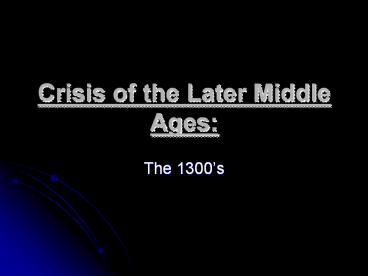Crisis of the Later Middle Ages: PowerPoint PPT Presentation
1 / 29
Title: Crisis of the Later Middle Ages:
1
Crisis of the Later Middle Ages
- The 1300s
2
I. The Plague
3
1. Black Death (1347)
- Causes
- Bubonic plague carried by fleas on Asian black
rats- from ships returning to Europe - Poor sanitation- No sewage systems, garbage on
the streets - Overcrowded homes- Families would sleep in the
same common room - Poor health and hygiene
- Poor Harvests Malnutrition Weak Immune system
- Water supply contaminated lack of bathing
4
(No Transcript)
5
2. Plague Results
- 30 of the Population died
- Severe impact on European economy- Lack of labor
higher wages - Serfdom ended in many areas first enclosure of
fields in Britain- (less labor, sheep herding) - Clergymen died helping the sick
- Population recover until the mid-1500s.
6
- Jews blamed
- Reinforced anti-Semitism in Europe
- Literature and art reflected a culture of Death
7
Dance of Death (Danse Macabre)
- The authority
- Oh rational creature,who desires eternal
life.Here you have wisdom, worth notingto
properly end your mortal life.It's called the
dance of death,which everyone will learn to
dance.For man and woman it's natural,Death
spares neither small nor great.In this mirror
everyone can readthat he will dance
likewise.Sage is he who mirrors himself
well.Death makes the living advance,You will
see the greatest lead the dancefor there is
nobody whom Death does not vanquish.It's a
pitiable thing to consider.All are forged out of
the same material.
8
II. The Hundred Years War (1337-1453)
- CauseEnglish crown lays claim to the duchy of
Aquitaine in France (Through the lineage of
William the Conqueror and other intermarriages) - The French Crown confiscated the English
controlled areas.
9
Its All RelativeFrench and English Royal Tree
10
1. The War
- Fought in France and the Low Countries (The
Netherlands) - By 1415 (Battle of Agincourt)- England was
winning - The State of Burgundy threatened Frances eastern
border
11
(No Transcript)
12
2. The War Turns
- Joan of Arc
- Claimed she heard voices of the Saints
- Convinced Charles VII to lead his armies
- Led French army to victory at Orleans in 1429
- Charles VII crowned king,
- Captured by English in 1431, burned as a witch
- Remained a symbol of the French, and used as a
rallying point.
13
France in 1430
14
3. 100 Year War Results
- France kicks England out
- Creation of modern nation states begin
- Peasant Revolts
- Causes
- High Taxes during Hundred Years War,
- Desire for higher wages,
- Hostility toward aristocracy,
- Higher expectations among peasantry.
- English Peasant Revolt (1381) - Largest of the
Revolts, 100,000 people involved - Jacquerie in France (late 14th-early 15th)
- Results
- Revolts crushed
- Ends serfdom in England in 1550
15
III. Crises in the Church
- Western Society controlled by the Catholic church
since the fall of the Roman Empire - Religious leaders were frequently more powerful
than governmental or political leaders - Many Popes were the most influential people in
Europe
16
1. The Two Churches
- Western Europe in the Middle ages was unified
through the Roman Catholic Church. - The Byzantine Empire, parts of Eastern Europe and
Russia were unified through the Greek Orthodox
Church - The two churches did not cooperate with each
other.
17
2. Church Critics
- Marsiglio de Padua
- Claimed the State should control the church
- The church should be run by a council of lay
people (non-clergy) and priests above the Pope.
18
- John Wyclif (1320-1384)
- Believed the Church should only follow Scripture
(foreshadowed M. Luther) - Translated the Bible into English
- His followers became known as the Lollards
19
- John Hus (1369-1415)
- Ideas similar to Wyclif
- Led nationalistic revolt in Bohemia (Czech
republic) - Captured, tried, and burned at the stake for
heresy - His followers, the Hussites- started large
revolts in the 14th century.
20
3. The Babylonian Captivity (1309-1377)
- To escape from the infighting between the
powerful families that produced former Popes, the
Church looked for a safer place and found it in
Avignon - Beginning with Clement V, elected 1305, the next
7 popes in Avignon were French. - Damaged the prestige of the Papacy, believed to
be under French Royal control. - The economy of Rome suffered without the
patronage of the Papacy.
21
4. The Great Schism 1377-1417
- The election of two Popes- one in Rome, one in
Avignon - Further weakened the Papacy
22
4. Conciliar Movement (1409-1418)
- Ended the Great Schism
- Created the Council of Cardinals, in an attempt
to reform the church - Idea failed, Pope remained supreme authority in
the church.
23
IV. Life in the Later Middle Ages
24
1. Marriage
- Men- mid 20s
- Women-16-18
- Divorce not allowed in Catholic countries
- Arranged Marriages for economic reasons common
- Prostitution existed
25
2. Work
- Church calendar and growing seasons closely
connected - Small percentage of freemen (artisans) protected
by guilds - Serfdom reduced- (due to Plague)
26
3. Recreation
- Aristocracy- Jousting tournaments
- Common people- Wrestling, archery, horse racing,
bear-baiting, dog fights
27
V. Learning
- Universities had started to open in the 13th
century. (Paris and Oxford) - As modern States developed, so did modern
languages
28
Nationalistic Literature(Vernacular language)
- Dante Alighieri Divine Comedy
- Geoffrey Chaucer- The Canterbury Tales- explored
the various roles in English life - Francois Villon Grand Testament, French poet,
explored French life
29
2. ScholasticismThomas Aquinas (1224-1274)
- Crux of late medieval philosophy
- Attempted to connect reason and faith using logic
to support Christian doctrine. - Attempted to fit Aristotles ideas into Christian
thinking - Challenged by later Renaissance Humanists

